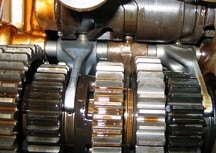 Lubrication is the act and consequence of lubricating . This verb (lubricate), for its part, refers to the application of a substance to minimize the friction that occurs when different elements come into contact .
Lubrication is the act and consequence of lubricating . This verb (lubricate), for its part, refers to the application of a substance to minimize the friction that occurs when different elements come into contact .
Lubrication is very important in the field of mechanics . When there are two moving parts, the use of a lubricant facilitates gear movement and reduces wear.
The lubricant must not degrade and must be resistant to pressure and high temperatures. Lubrication can be achieved with liquid products (of greater or lesser viscosity) or with solid products. Regarding their origin, lubricants are divided into synthetic , vegetable or mineral .
Internal combustion engines , like those used in automobiles, require lubrication. Vehicles , in this framework, have a lubrication system that reduces the wear of the different engine parts. A synthetic oil or a mineral oil can be used as a lubricant.
For the engine to function correctly and not be damaged, it is therefore essential to ensure its lubrication. That is why you must regularly check the car's oil level and replace said lubricant every certain number of kilometers traveled to guarantee its effectiveness.
It is important to note that some phenomena are also considered forms of lubrication even though humans intervene in their development . In the field of motorized transport, for example, so-called aquaplaning can take place between a car and the road.
The phenomenon called aquaplaning , hydroplaning or aquaplaning is a case in which a vehicle passes through a road covered with water at a certain speed and loses traction, in addition to the driver being unable to control it properly. When this happens on all wheels, the car acts like a sled that is impossible to control.
It is necessary to establish a difference between aquaplaning and a situation in which water causes lubrication of friction between vehicles and the pavement, something that happens after light precipitation, for example.
Vaginal lubrication , on the other hand, is generated from the discharge secreted by the vagina. This lubrication helps the development of intercourse and protects the female sexual organ from infections .
If the vagina is not adequately lubricated, a woman may feel discomfort and pain during sexual intercourse. Lack of lubrication also increases the risk of infection.
 In short, lubrication causes a change in the relationship established between the two objects. If the lubricant was not applied, they would rub in a violent or harmful way for both. However, the presence of this substance results in a loss of space for them, no matter how small: the lubricant film has a thickness that objects cannot occupy, and this can generate a slight widening of the system .
In short, lubrication causes a change in the relationship established between the two objects. If the lubricant was not applied, they would rub in a violent or harmful way for both. However, the presence of this substance results in a loss of space for them, no matter how small: the lubricant film has a thickness that objects cannot occupy, and this can generate a slight widening of the system .
The science that is responsible for the study of lubrication is called tribology . It also includes friction and wear in its points of interest, since they are phenomena that are closely linked to lubrication.
The study of tribology focuses on solid surfaces that are in motion, where we can encompass the situations mentioned in the previous paragraphs, such as the advancement of a vehicle on a road or the rubbing of the internal components of a machine .
The fields of knowledge necessary to understand these phenomena are materials technology, physics and chemistry. Despite them, even without any technical concept we can easily appreciate the differences that lubrication brings to a system, and the harm of not using it.
